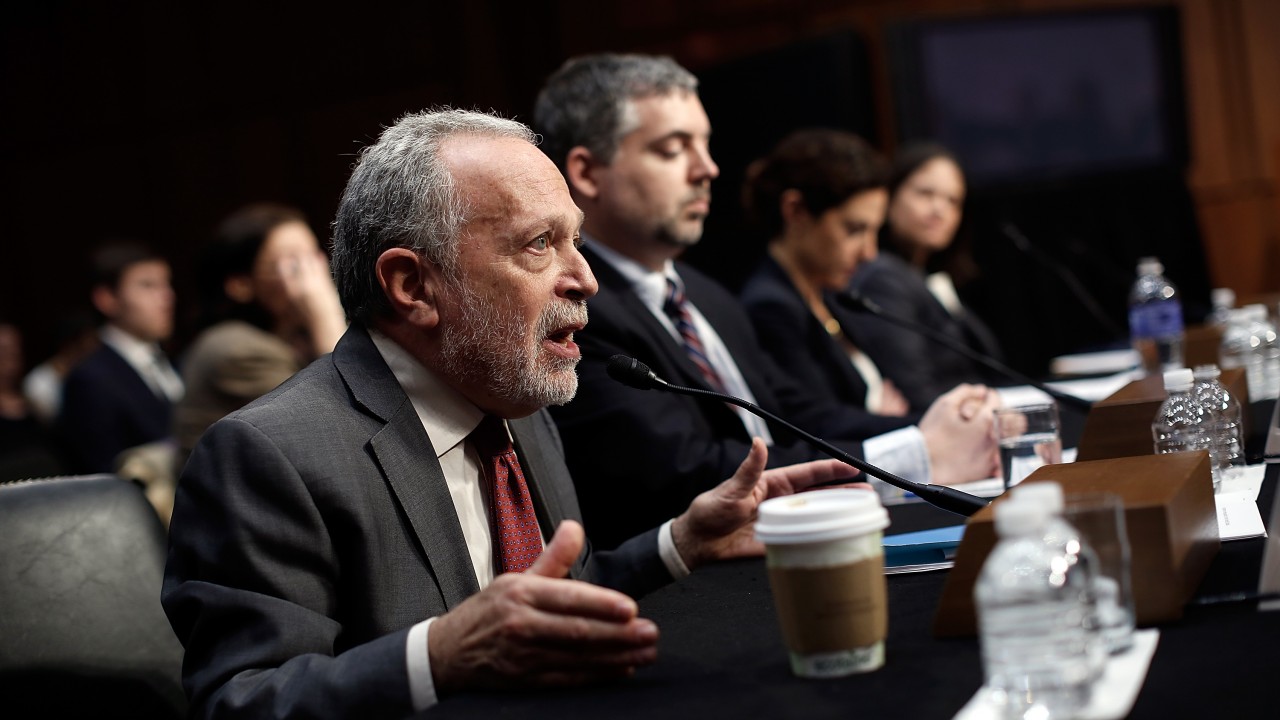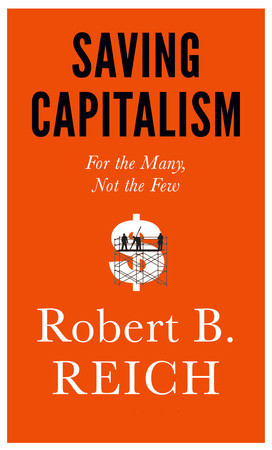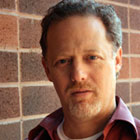
Robert Reich testifies before the Joint Economic Committee, January 16, 2014, on the topic of "Income Inequality in the United States." (Photo by Win McNamee/Getty Images)
This post originally appeared at Capital & Main. You can read the second part of this profile here.
It’s two weeks before Thanksgiving, and a crowd of 500 people has filled the Silicon Valley Commonwealth Club to hear former US Labor Secretary Robert Reich discuss a decidedly less than festive topic: How the economy is leaving most Americans behind. The subject, which inspired Reich’s latest book, Saving Capitalism, hits particularly close to home here, where uber-rich tech titans coexist with legions of low-wage workers, even as the middle class is increasingly squeezed out of nearby communities like Redwood City and Milpitas by ever-rising housing prices.
But Reich has no intention of bludgeoning his audience with bleak statistics and grim predictions. “As you can see, the economy has worn me down,” says the 4-foot-11-inch Reich, pausing as laughter spreads across the room. “Really, before the Great Recession I was, you know, 6 foot 2.”
Moments earlier, when I met Reich in an empty banquet room and asked if he preferred to be called “Professor” or “Bob,” he answered in a deadpan voice: “‘Your Highness.’” I had traveled from Los Angeles to trail Reich for a couple of days to better understand the man who has become at once the most visible, and most entertaining, critic of the nation’s unequal economy.
In an era dominated by polarizing blowhard commentators, Reich is an anomaly: The avuncular scholar who prefers to disarm rather than denigrate.
“He can never be accused of being a zealot,” Alan Simpson, the arch-conservative former Republican Senator from Wyoming and one of Reich’s best friends, explained to me later. “A zealot is one who, having forgotten his purpose, redoubles his efforts. He is not that. He’s a very complex and a very deep, centered human being. And he thinks of human beings who are not doing well, and he gravitates toward, ‘How do you solve that?’”
Reich’s humor is woven seamlessly into a narrative that is also veined with generous doses of history, a style that, along with his fame, has made him a popular professor at the University of California, Berkeley’s Goldman School of Public Policy, where he has been a faculty member since 2006.
“Bob is one of the best explainers out there,” said Jared Bernstein, Vice President Joe Biden’s former chief economist and who, like Reich, is one of the country’s most prominent progressive voices on inequality. “He takes issues that are complicated and multilayered and distills their essence into quick, simple, accurate and entertaining points that make sense to any interested party. Listening to Bob is like watching a master musician or athlete.”
As he nears 70, Reich is explaining at a furious pace, with a nonstop output of blog posts, op-eds, videos and lectures. (He has even appeared in an animated video for Capital & Main.) “I don’t want to do anything else,” he told me the day after the Silicon Valley speech. “This is extremely satisfying. I have the best job in the world.”
I was interviewing Reich in his U.C. Berkeley office, where, dressed casually in a blue sweater and gray jeans, he was catching his breath between book tour events. In one corner of the room stood a video camera attached to a tripod, ready to use whenever Reich records messages requested by groups across the country. On a wall hung a frame with Supreme Court Justice Louis Brandeis’ famous quote: “We may have democracy, or we may have wealth concentrated in the hands of a few, but we can’t have both.”
The 35-year decline in wages for most Americans, coupled with the demise of pensions, the escalating cost of housing, rising student debt and a host of other discouraging economic indicators, has led to what Reich and many other observers see as a steady erosion of the American Dream. He distilled his thoughts about the seemingly inexorable waning of that dream in the 2013 documentary Inequality for All, which offers a primer on the prolonged tailspin of the American middle class and is shot through with healthy doses of his trademark humor.
— Robert Reich
Saving Capitalism expands Reich’s critique: It’s not just the economic system that is failing us, he argues, but a political system that, in the wake of the Supreme Court’s 2010 Citizens United ruling, is controlled more than ever before by the wealthy. In Reich’s view, the “free market” is a misleading construct that distracts from the reality that rules govern any market economy — and that in the US those rules are being rewritten to advance the interests of a few rather than the many.
“Anybody who thinks that the answer is found in policy has not been paying attention,” he said, revealing a major shift in thinking for a man who has championed his share of policy prescriptions. “Good policies are a dime a dozen. The real issue now is a matter of power. How in the world do you get good policies enacted and enforced?”
Reich’s firm belief that fundamental economic change will only come through a sweeping realignment of political power may partially explain the intensity of his crusade against the excesses of contemporary capitalism. As economic inequality has entered the national conversation, he has become to that issue what Al Gore is to climate change – only funnier.
He credits one of his early bosses with teaching him the importance of humor: the late Robert Bork, for whom Reich worked when Bork was Solicitor General in the Ford administration. “He was a lovely man. Very funny,” Reich recalled. When Bork came up during the question-and-answer portion of his Silicon Valley appearance, Reich said, “I liked him a great deal. We disagreed, however, on the First, Second, Fourth, Fifth, Eighth and Ninth Amendments to the Constitution, which put a crimp in our working relationship.”
Though hardly the lightning rod his old boss was, Reich attracts his share of criticism, some of it quite heated. During an argument over income taxes on ABC’s This Week in 2011, conservative commentator George Will fumed, “You are a pyromaniac in a field of strawmen.” On the left, Reich has been targeted by fellow economist Paul Krugman, who in one article acidly dismissed his colleague’s concerns about economic insecurity among well-paid workers: “Like much of what Reich says, this story is clear, compelling, brilliantly packaged and mostly wrong.” (Krugman did write a positive review of Saving Capitalism for the New York Review of Books.)
Reich rolls with the punches. During his Silicon Valley speech, he acknowledged that his new book has raised the ire of both ends of the political spectrum. While on a promotional tour through several red states, he told the Commonwealth Club audience, he found that “nobody liked the title, Saving Capitalism. They were kind of annoyed — ‘It sounds like you are being critical. What’s wrong with capitalism?’ I got back to Berkeley and nobody liked the title. They said, ‘Why do you want to save it?’”
Born in 1946 in Scranton, Pennsylvania, a city renowned for its fierce union organizing battles of the early 20th century, Reich grew up in what he describes as a middle-class home. “We weren’t rich but never felt poor, and our standard of living rose steadily throughout the 1950s and 1960s,” he writes in Saving Capitalism, evoking collective memories of a simpler, more prosperous era. It was a time when his father got ahead by selling women’s clothing.
In our interview, Reich added some nuance to his personal story, shedding light on his decades-long effort to change an often unforgiving economy. His dad, now 101, struggled for years with his business, moving it from town to town until things finally improved, in part due to his mother helping out in the shop. “My father worked incredibly hard and I was sensitive to his anxiety about just keeping a roof over our heads and keeping us going,” he explained.
Reich and his family also experienced anti-Semitism, further sensitizing him to exclusion from the halcyon promise of mid-century America. And then there was his height – born with a rare genetic disorder that stunted his growth, he was bullied throughout his youth and sought protection from older boys.
I asked Alan Simpson, who now practices law in Cody, Wyoming, why he thought Reich was so driven to address the economic inequities of American society. “It has to do with his upbringing, his background, his philosophy of life,” he said.
That philosophy includes respect for those with views different than his own, like Simpson. The two met in Washington, DC in the early 1990s, and hit it off right away when the 6-foot-7-inch senator introduced himself at a Beltway mixer, prompting Reich to respond, “I can’t even see you,” and jump on a chair.
Simpson shared with me a story about visiting Reich shortly after he became Labor Secretary. “I said to my staff, ‘I’m gonna go over to see Bob Reich, I’m gonna go eat lunch with him.’ And they said, ‘You don’t want to go see Bob Reich, he’s a liberal Democrat, for God’s sake. He’s FDR, you know, he’s this and that.’ So I said, ‘I don’t give a damn about that, that’s where we’re going.’ And then one time he told his staff he was going to go over to see Simpson. They said, ‘Oh, God, you don’t want to go see Simpson. He’s a Republican from Wyoming.’ He said, ‘I don’t care what you think about it.’ So we would actually meet somewhere and have a tuna sandwich and just have a good time.”
(In the late 1990s, while the two men were both living in Boston, they co-hosted a PBS political talk show, The Long and the Short of It, which attracted guests in part because of the congenial relationship between the two. “People loved coming [on] because we weren’t playing sharpshooter or talking across each other,” Simpson said.)
His tolerance for dissenting ideas notwithstanding, Reich is very much a product of the liberal social movements of the 1960s. Like many from his generation, Reich’s idealism was both forged and shaken by the traumatic events of that time. His childhood friend Michael Schwerner was one of three civil rights activists murdered by the Ku Klux Klan in Philadelphia, Mississippi in 1964, and he lost another friend in the Vietnam War. Reich would later intern for Senator Robert F. Kennedy, absorbing his “absolute commitment to a more just society.” With the 1968 assassinations of Kennedy and Martin Luther King Jr., and with American cities erupting in flames, Reich began to sink into despair. “I thought the country was going to hell,” he admitted.
But Reich’s innate optimism and buoyant temperament have carried him through several decades of generally bad news for the middle class that he sees as the linchpin of the country’s economic stability and social cohesion. These also sustained him during his years in the Clinton Administration, where he witnessed a brilliant politician slide down the slippery slope of sometimes unprincipled compromise.
“Bill Clinton is a very skillful, charming man, and I learned a lot watching him at close range,” observed Reich, who met Clinton when they were on a boat sailing to England as young Rhodes Scholars in 1968. “I learned what skillful politicians do to win people over. I certainly learned that I’m not one, and I also learned how easy it is to confuse means with ends. This is a deep and endemic problem in politics, because a politician is always trading off means and ends. But sometimes those trade-offs are so demanding and persistent that a politician loses sight of what the ends are all together. It all becomes means.”





